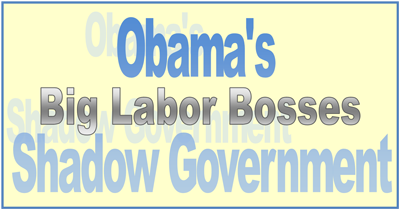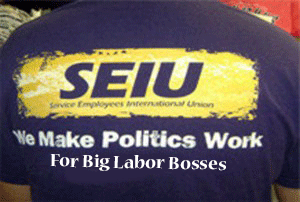Big Labor Bosses Are Back at the White House
An obvious residual effect of President Obama’s re-election was the renewal of his government giveaways to the union bosses.

An obvious residual effect of President Obama’s re-election was the renewal of his government giveaways to the union bosses.

The Los Angeles Times is reporting that One of Los Angeles’ largest public employee unions admitted Tuesday…

Reason opines that the fiscal reality of many cities have ended the love affair, in some instances, between local Democrat mayors and the union who elected them. But, it will likely not bring reform aslong as political machines a mostly funded and controlled by labor union bosses: When Chicago public school teachers started the fall semester by turning down a $400 million contract offer that would have boosted pay by 16 percent over four years, my first concern wasn’t for the children. It was for the Democrats. Sure, the walkout by Chicago Teachers Union members caused havoc for kids. But I’ve been to public school, and I can tell you they didn’t miss much. The strike’s lasting damage was to the party that since at least the early 20th century has been labor’s best friend. Chicago Mayor Rahm Emanuel is not just some schmuck in the donkey party: He is President Barack Obama’s former chief of staff, the congressional leader behind the Democrats’ 2006 House takeover, a Clinton administration arm twister so feared that he is still known by his ’90s nickname, Rahmbo. But the strike made Chicago’s tough-guy mayor look like Chuck “Bayonne Bleeder” Wepner. Striking teachers dubbed him “Empermanuel,” accused him of having “no respect for us as people,” and even claimed (falsely, it turned out) that Emanuel was a fan of the Canadian alt-rock quartet Nickelback. When the teachers returned to work after more than a week on the picket line, they had scored a big pay increase and crippled the teacher-evaluation testing at the heart of the strike, a resolution Emanuel unconvincingly called an “honest compromise.” Emanuel is one of many recent Democratic chief executives who have, with varying levels of enthusiasm and success, tried to confront government employee unions. California Gov. Jerry Brown struggled for two years to get a minor pension bill through the legislature. New York Gov. Andrew Cuomo in March got a partial pension reform that is expected to save $3 billion a year out of the Empire State’s $133 billion annual budget. Washington, D.C., Mayor Adrian Fenty lost his job when he took on the teachers union.

Reason opines that the fiscal reality of many cities have ended the love affair, in some instances, between local Democrat mayors and the union who elected them. But, it will likely not bring reform aslong as political machines a mostly funded and controlled by labor union bosses: When Chicago public school teachers started the fall semester by turning down a $400 million contract offer that would have boosted pay by 16 percent over four years, my first concern wasn’t for the children. It was for the Democrats. Sure, the walkout by Chicago Teachers Union members caused havoc for kids. But I’ve been to public school, and I can tell you they didn’t miss much. The strike’s lasting damage was to the party that since at least the early 20th century has been labor’s best friend. Chicago Mayor Rahm Emanuel is not just some schmuck in the donkey party: He is President Barack Obama’s former chief of staff, the congressional leader behind the Democrats’ 2006 House takeover, a Clinton administration arm twister so feared that he is still known by his ’90s nickname, Rahmbo. But the strike made Chicago’s tough-guy mayor look like Chuck “Bayonne Bleeder” Wepner. Striking teachers dubbed him “Empermanuel,” accused him of having “no respect for us as people,” and even claimed (falsely, it turned out) that Emanuel was a fan of the Canadian alt-rock quartet Nickelback. When the teachers returned to work after more than a week on the picket line, they had scored a big pay increase and crippled the teacher-evaluation testing at the heart of the strike, a resolution Emanuel unconvincingly called an “honest compromise.” Emanuel is one of many recent Democratic chief executives who have, with varying levels of enthusiasm and success, tried to confront government employee unions. California Gov. Jerry Brown struggled for two years to get a minor pension bill through the legislature. New York Gov. Andrew Cuomo in March got a partial pension reform that is expected to save $3 billion a year out of the Empire State’s $133 billion annual budget. Washington, D.C., Mayor Adrian Fenty lost his job when he took on the teachers union.
Leo Gerard, the boss of the United Steelworkers Union, warned Democrats not to compromise at all on the fiscal cliff. Gerard said any Democrats who…

[media-credit name=” ” align=”alignright” width=”150″][/media-credit]From the November 2012 issue of the Capital Research Center’s Labor Watch: Battle Plan of the Shadowbosses: The strategy to unionize government employees who aren’t government employees By Mallory Factor with Elizabeth Factor (PDF here)…
Union bosses are wasting no time in trying to engineer their spoils from the president’s re-election victory. The Wall Street Journal reports when asked, Mr. Trumka said he also wants labor laws revamped … though he wouldn’t be more specific or…
Should President Obama be re-elected, his thank you note to the union bosses will come in the form of legislation, according to AFL-CIO boss Richard Trumka: AFL-CIO President…
The powerful union bosses in Nevada are encouraging non-citizens to go to the polls. From the Las Vegas Review Journal: Voter registration fraud is not a groundless conspiracy. It is not a hypothetical threat to election integrity. In Nevada, a battleground state that could decide the presidency and control of the U.S. Senate, it is real. Last week, I met with two immigrant noncitizens who are not eligible to vote, but who nonetheless are active registered voters for Tuesday's election. They said they were signed up by Culinary Local 226. They speak and understand enough English to get by. But they don't read English especially well. They say the Culinary official who registered them to vote didn't tell them what they were signing and didn't ask whether they were citizens. The immigrants said they trusted that the union official's request was routine, thought nothing of it and went about their work. Then the election drew closer. Then the Culinary canvassers started seeking them out and ordering them to go vote. One of the immigrants was visited at home by a Culinary representative and said the operative made threats of deportation if no ballot was cast.